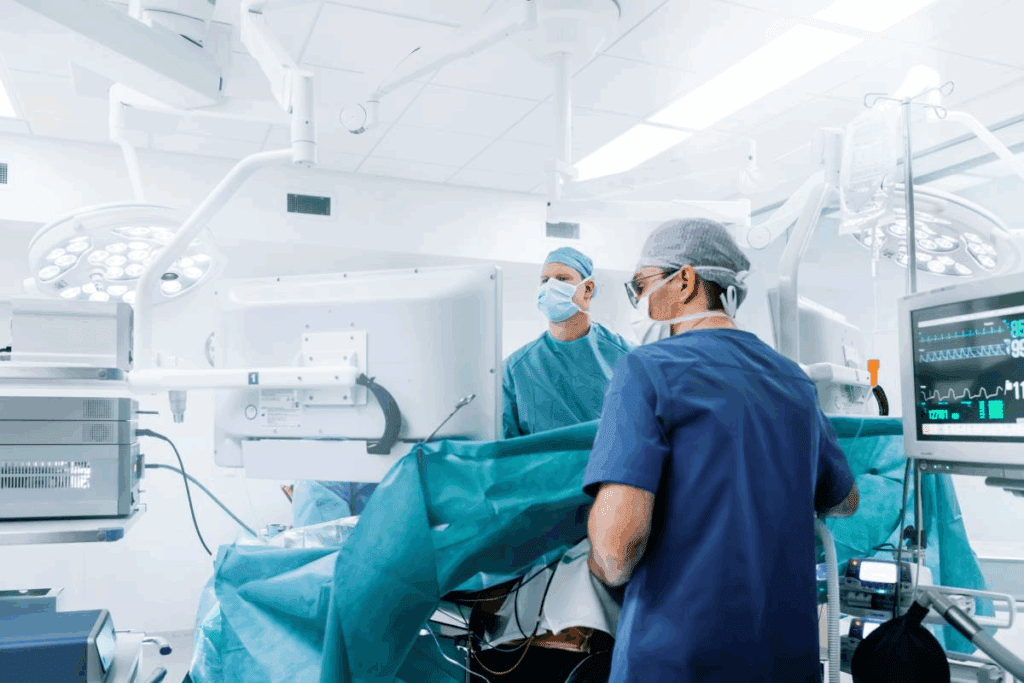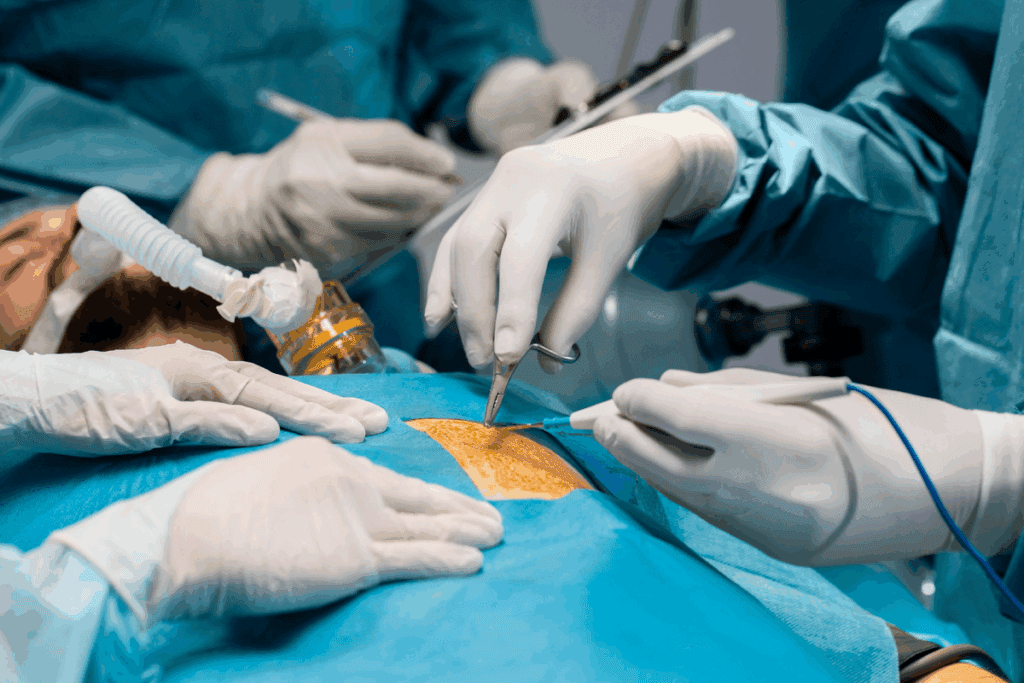Last Updated on November 26, 2025 by Bilal Hasdemir

Recovering from colon surgery is a big deal. It’s important to pay attention to how you sleep. At Liv Hospital, we know that sleep is key for healing. The first few weeks after surgery are tough, but it can take up to two to three months to fully recover.Asking “can I sleep on my side after colon surgery?” Get the best advice on safe sleeping positions for a smooth recovery.
Patients often ask about the best sleeping positions during this time. Doctors usually say to sleep on your back. But, sleeping on your side might be okay too, depending on your doctor and how you’re doing. We’ll look at the best sleeping positions after colon surgery and give tips on easing discomfort during recovery after colon surgery.

Colon surgery, like bowel resection, is a big deal. It needs careful thought and care after the surgery. Knowing about these surgeries helps with a smooth recovery.
There are many types of colon surgeries. Each one has its own reasons and results. The main ones are:
Knowing which surgery you had is key to recovering well.
During surgery, the surgeon makes cuts to get to the colon. The method used can be open surgery or minimally invasive, based on your health and the surgeon’s advice.
The steps include removing the bad part of the colon and joining the rest back together, if it’s possible.
Right after surgery, you’ll be watched closely in the recovery room. You can expect:
Knowing about colon surgery helps prepare for recovery. It tells you what to expect after surgery.

Sleep is key to healing after colon surgery. It affects how long it takes to recover. Our body fixes damaged cells, builds muscle, and boosts our immune system while we sleep.
Good sleep is crucial for these healing processes. Lack of sleep can slow healing, make pain worse, and extend the recovery period.
Sleep helps healing in many ways. Deep sleep releases hormones that fix tissues and fight infections. It also strengthens our immune system, which is vital after surgery.
Also, sleep helps manage pain. Studies show that well-rested patients handle pain better. This can mean less pain medication and a lower risk of addiction.
Patients often struggle to sleep after colon surgery. Discomfort, pain, or anxiety can make it hard. The surgical site may hurt, making it hard to find a comfortable sleep position.
Stress from the surgery can also cause insomnia or disrupted sleep. Plus, side effects from anesthesia or pain meds can make sleep tough.
The quality of sleep affects how long it takes to recover from colon surgery. Bad sleep can keep you in the hospital longer and slow your return to normal life. Good sleep, on the other hand, helps you heal faster, reduces complications, and boosts your overall health.
By focusing on sleep and solving sleep issues, patients can recover faster. This improves their recovery after colon surgery experience.
Many patients wonder if they can sleep on their side after colon surgery. Doctors usually suggest sleeping on your back. But, whether you can sleep on your side depends on your surgeon’s advice and how well you’re recovering.
Doctors often say to sleep on your back after colon surgery. This helps avoid putting pressure on your belly and lowers the chance of problems. Sleeping on your back is best in the early stages of recovery.
As you get better, your doctor might say it’s okay to sleep on your side. This usually happens when you’ve healed enough and the risk of hurting the surgery site is low. Using a pillow between or under your knees can make side sleeping more comfortable.
Several things affect what sleeping position is best after colon surgery. These include the surgery type, your health, and any complications. Your surgeon will look at these when deciding on the best sleeping position for you.
Experts say sleeping on your side with the right support can ease pressure and discomfort. Always listen to your doctor’s advice on sleeping to help your recovery go smoothly.
Choosing the right sleeping position is key to a smooth recovery after colon surgery. How you sleep can affect your healing, making it more comfortable and reducing risks.
Back sleeping is often advised after colon surgery. It helps avoid putting too much pressure on your belly. Here are some tips to make it more comfortable:
Medical experts say, “Using pillows to support the body and alleviate pressure on the incision site is crucial for comfortable recovery.”
“The key to comfortable back sleeping after colon surgery is to ensure that your body is properly aligned and supported.”
If you’re used to sleeping on your side, you can keep doing it after surgery. Here’s how to do it safely and comfortably:
| Sleeping Position | Supportive Measures | Benefits |
| Back Sleeping | Pillow under knees, thin pillow under lower back | Reduces pressure on abdominal area |
| Side Sleeping | Firm pillow between knees, body pillow | Maintains hip alignment, reduces abdominal pressure |
Some sleeping positions can be too hard on your body after surgery. It’s best to avoid:
By steering clear of these positions and using the right sleeping techniques, you can significantly enhance your recovery experience. This will help reduce discomfort and support your body’s natural healing.
After colon surgery, it’s key to make your sleep area comfy. A good sleep space helps your body heal better. It makes sure you get a good night’s rest.
Getting your bed just right is important. It helps avoid putting too much pressure on your body, especially where you had surgery. Supportive pillows are great for keeping you comfy and easing pressure.
Try using a pillow under your knees if you sleep on your back. It helps take the strain off your tummy. If you sleep on your side, a pillow can hug your body for support.
It’s important to manage pain at night so you can sleep well. Always follow your doctor’s advice on pain meds. A heating pad or cold pack, as your doctor suggests, can also help with pain.
Having a calming bedtime routine is good too. It tells your body it’s time to sleep.
The temperature and quietness of your sleep area matter a lot. A cool, quiet, and dark room is best for sleep. Blackout curtains, earplugs, or a white noise machine can help.
Also, keep your bedroom at a comfy temperature. This stops you from getting restless at night.
By making these changes, you can make your sleep area better for healing after colon surgery. It helps your body recover faster.
Knowing how long it takes to heal from a colon resection is key for patients. The recovery from colon resection surgery has many stages. It starts in the hospital and continues at home.
The first part of recovery is in the hospital, lasting 3 to 7 days. Medical staff watch over the patient closely. They manage pain and look for any complications.
Patients get fluids and nutrition through an IV. Their bowel function is checked as it gets back to normal. The hospital stay is for immediate care and to handle any problems right away.
After leaving the hospital, patients start the early home recovery phase. This can last several weeks. It’s important to manage pain, follow a diet, and slowly get back to physical activities.
Patients should be aware of possible complications and know when to get medical help. Regular check-ups with healthcare providers are key during this time to track healing.
Long-term healing after colon resection surgery can take up to three months. During this time, patients see big improvements in their health and bodily functions.
Getting back to normal sleep is part of recovery. Most patients see their sleep improve in 1-2 months. This is because pain goes down and energy goes up.
To make the recovery timeline clearer, here’s a summary table:
| Recovery Stage | Duration | Key Focus |
| Hospital Stay | Days 1-7 | Pain management, monitoring for complications |
| Early Home Recovery | Weeks 1-4 | Diet management, gradual increase in physical activity |
| Long-Term Healing | Months 1-3 | Return to normal bodily functions, improvement in overall health |
By understanding the healing time and recovery timeline, patients can prepare better. They know what to expect at each stage of their recovery.
After colon surgery, it’s important to know about possible complications. While they don’t happen often, knowing about them can help your recovery. We’ll show you how to spot warning signs, what to do if you see blood in your stool, and how to handle common discomforts.
Keep an eye on how your body reacts to the surgery. Some symptoms might mean you need to see a doctor right away. Look out for:
Seeing blood in your stool after colon surgery can be scary. Some bleeding is okay at first, but too much or lasting bleeding is not. If you see a lot of blood, tell your doctor right away. They’ll check if it’s normal healing or if there’s a problem.
After colon surgery, you might feel pain, bloating, and changes in bowel habits. Handling these discomforts well is important for a better recovery. Here are some tips:
Knowing about possible complications and taking steps to manage your recovery can help. This way, you can reduce risks and heal faster.
Life after bowel resection surgery needs careful planning. We must focus on our health in many ways. Making the right changes helps us feel better.
Eating right is key to healing after surgery. We should eat foods that are easy to digest and full of nutrients. It’s best to avoid foods that might upset our stomachs.
Here are some dietary tips:
| Food Type | Recommended | To Avoid |
| Fruits | Bananas, applesauce | Berries, citrus fruits |
| Vegetables | Well-cooked carrots, green beans | Broccoli, cabbage |
| Proteins | Lean meats, fish, eggs | Fatty or fried foods |
Starting to move more is important for recovery. Begin with short walks and gentle exercises. Then, you can do more challenging activities.
Here are some activity tips:
Finding the right balance between rest and activity is key. We must listen to our bodies and not push too hard.
After surgery, we might need to make lasting changes. These could include eating differently and staying active to keep healthy.
It’s important to keep in touch with our healthcare team. They can help us stay on track and address any issues.
By making these changes, we can help our bodies heal and improve our life after surgery.
Recovering from colon surgery takes patience, understanding, and support. It’s a tough journey, but a smooth recovery is key to getting back to health.
Medical experts stress the need to follow care instructions and keep up with follow-up appointments. This ensures a good recovery from bowel resection or sigmoidectomy. By knowing the recovery process and following the guidelines in this article, you can confidently move through your recovery.
A successful recovery isn’t just about healing physically. It’s also about making lifestyle changes for better health. Stay committed to your recovery plan. And don’t hesitate to ask your healthcare provider if you have any concerns or questions.
Recovery from colon resection surgery takes several weeks. You’ll likely stay in the hospital for 3-7 days. Full recovery can take 6-8 weeks or more.
It’s best to avoid sleeping on your side right after surgery. But, your surgeon might give different advice. Always follow their instructions on sleeping positions.
Use pain meds as your doctor prescribes, try relaxation techniques, and make your sleep area comfy. Supportive pillows and a well-set bed can also help.
Look out for severe pain, fever, vomiting, blood in stool, or trouble urinating. If you see these signs, call your doctor right away.
Healing from a bowel resection takes weeks to months. You’ll likely stay in the hospital for 3-7 days. It may take 6-8 weeks or more to fully recover.
Start with a liquid diet, then move to soft foods, and eventually a normal diet. A healthcare provider or dietitian can help with your diet.
Yes, some people may see blood in their stool after surgery. But, if the bleeding is heavy or doesn’t stop, call your doctor.
It’s important to rest and move a bit. Follow your doctor’s advice on how much to move. Resting helps your body heal.
Sleeping on your back with support is best. Sometimes, side sleeping is okay with the right support. Avoid positions that hurt your belly.
Make your bed comfy, use pillows, manage pain, and keep it cool. A calm space helps you sleep better.
Subscribe to our e-newsletter to stay informed about the latest innovations in the world of health and exclusive offers!